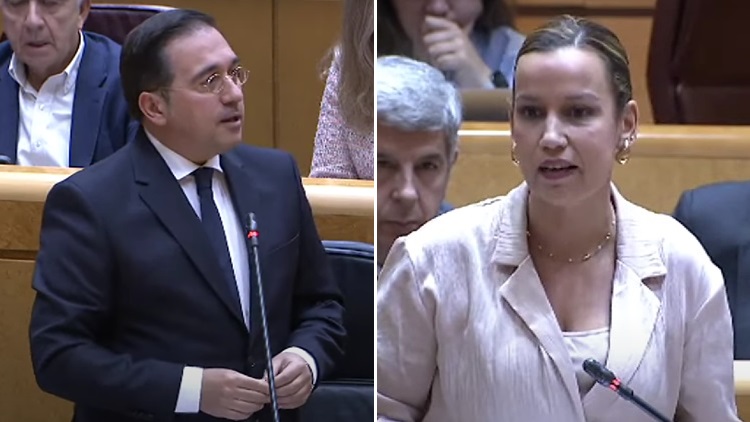Eduardo González
People’s Party Senator Isabel Moreno Mohamed yesterday accused the Government of having renounced the “principle of reciprocity” and opting for “submission” in relations with Morocco. In his response, the Minister of Foreign Affairs, José Manuel Albares, lamented the “anti-Moroccan obsession” of the PP, which lacks “an alternative foreign policy of neighbourliness with Morocco” and wants to “return to the clash of Perejil”.
During her speech in the plenary session of the Upper House, Moreno Mohamed, senator for Melilla, lamented Rabat’s failure to fulfil its commitment to open the land crossings with Ceuta and Melilla. “Morocco persists in its intention to suffocate the Spanish cities, and the most serious thing is that it seems to be doing so with the connivance of the Spanish government,” she denounced.
“There is no border in the world where such asymmetrical and unequal bilateral relations are allowed, the law of the funnel: from Morocco to Spain the regime of travellers in the transit of goods is allowed, but the other way round we cannot even cross a carton of milk,” the senator said.
“What is serious is to have a minister who doesn’t care about what happens in Ceuta and Melilla and at their borders, where the government has renounced the principle of reciprocity, that Morocco should comply with fundamental international rules and treaties: they have exchanged legality for arbitrariness and reciprocity for submission”, Moreno Mohamed said.
Moreno also reproached the government for the fact that it is Morocco that “sets Spain’s foreign agenda” and decides “when borders are opened, when they are closed and under what conditions”. “The commercial customs office with Melilla has been closed since 2018, although they promised that it would be opened in January 2023, just as they announced that they would open another in Ceuta, but they do not have the slightest credibility”, he added.
Albares
In his answer, Albares denounced that, for the PP, “foreign affairs are the foreign affair: their anti-Moroccan obsession”. “I cannot believe that it is precisely a senator for Melilla who is asking a Spanish foreign minister to tense relations with Morocco,” he warned.
“The commitment that Spain and Morocco have to achieve a transparent and regular crossing of people and goods already has benefits for Melilla and Ceuta, as the people of Melilla know,” Albares continued. “Irregular entries into both cities have fallen by 40 percent since 2022, and there is greater control and greater transparency at the border, all thanks to good relations with Morocco,” said the minister, who, on the other hand, made no reference to Morocco’s failure to comply with the travellers’ regime, to which the PP senator had referred.
According to Albares, the PP is “turning its back on the 170,000 Spaniards who live in Ceuta and Melilla and those who live in Andalusia and the Canary Islands, on 17,000 companies, on a million Moroccans living in Spain, on the ports of Algeciras and Tarifa”. “In 16 years they never had the intention of opening a customs office in Ceuta and they never did”, he denounced.
“But the most important thing of all is that you do not have an alternative foreign policy of neighbourliness with Morocco or any other country. The same clash and the same kind of foreign policy that led us to an illegal war in Iraq”, said Albares, referring to the small armed conflict that broke out in July 2002 between Madrid and Rabat following the military occupation of the island of Perejil by the Moroccan Royal Gendarmerie, which ended with the eviction of Moroccan troops.







